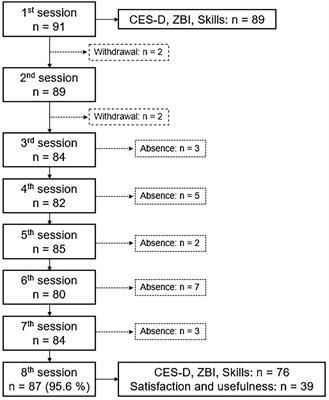Leo program, a short multi-family skill-based psychoeducational program for caregivers of relatives living with a severe mental disorder: a retrospective pilot study
Background: Caring for a relative with a severe mental disorder (SMD) is associated with high levels of burden and poor physical and mental health.

There is a dire need for family psychoeducational programs that can be provided as early as possible. This manuscript describes the pilot testing of “Leo” a motivational-based psychoeducational program for caregivers of individuals with a SMD.
The Leo program aims to provide caregivers with skills to best support their relative and to adopt self-care behaviors. Methods: We retrospectively analyzed medical records of caregivers who enrolled in a short, multi-family, skill-based psychoeducational program, consisting of eight 3-hour sessions over 8 weeks. Outcomes of interest included: i) adherence to the program, ii) satisfaction and perceived usefulness, and iii) pre-post changes in self-reported levels of depression (CES-D), burden (ZBI), and skills (10 Likert-scaled items). A network analysis was used to investigate the relationships between pre-post changes in self-evaluated skills and pre-post changes in burden and depression levels. Results: Over the 91 enrolled participants, 87 (95.6%) completed the program attending at least 5/8 sessions, 80.5% attending all sessions. Seventy-six caregivers fulfilled the questionnaires at baseline and after the program, and were included in the analysis. Although there was no evidence for significant change in self-reported depression levels (Cohen’s d=0.19, p=0.210), burden scores and all evaluated skills were improved post-intervention, with medium to strong effect size (Cohen’s ds from 0.47 to 0.87; p<0.001). Network output indicated that increased self-evaluated competence in 5 skills were associated with a global improvement in caregivers’ burden and/or depression scores. Post-intervention, 89.7% of caregivers were “very satisfied” and 82.1% found the program “extremely useful”. Conclusion: This pilot retrospective study shows high levels of satisfaction, perceived usefulness, and adherence to “Leo”, a short, multi-family, skill-based psychoeducational program with promising results in improving caregivers’ burden, self-evaluated competence in coping with caregiving demands and in self-care behaviors. This study provides preliminary insights into the mechanisms by which family psychoeducation might alleviate burden of care. A larger-scaled, controlled, randomized study with follow-up assessments is warranted to determine how burden, depression, and skills, as well as their inter-relationships, evolve over time.
Read the full article at the original website
References:
